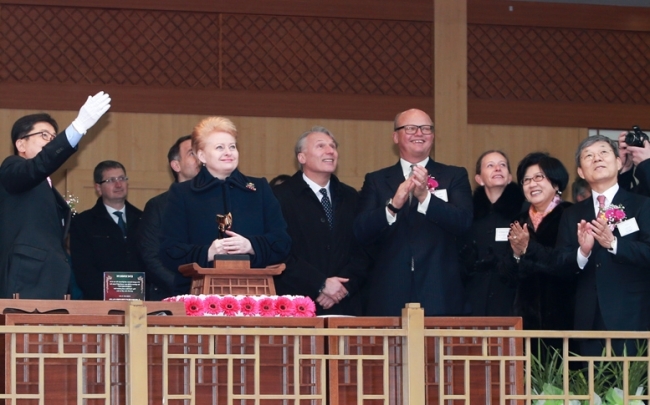 |
Lithuanian president Dalia Grybauskaite (left) attends a ceremony in Ulsan on Wednesday to commemorate the completion of the world’s first LNG-FSRU built by Hyundai Heavy Industries. Grybauskaite named the new unit “Independence.” (Hyundai Heavy Industries) |
Hyundai Heavy Industries, the world’s largest shipbuilder, said it completed the construction of the world’s first LNG-Floating Storage Regasification Unit for Hoegh LNG of Norway.
LNG FSRU refers to an offshore facility that stores LNG in its liquid state while floating on the sea and regasifies it to supply to facilities on land via submarines or onshore pipelines.
The units come in various shapes, and in this case, it was shaped to look like a vessel. Measuring 294 meters high and 46 meters wide, it is capable of storing up to 70,000 tons of chilled natural gas.
“The large-scale facility was built to look like a massive floating complex on the sea,” a Hyundai Heavy official said.
The new offshore facility will be delivered to a site at the port of Klaipeda, Lithuania.
Lithuanian President Dalia Grybauskait christened the vessel “Independence” during a ceremony held at Hyundai Heavy’s shipyard in Ulsan to commemorate the completion of the facility.
The project reflects Lithuania’s determination to attain energy independence from Russia.
“I expect that the new LNG vessel, built on the basis of Hyundai Heavy’s state-of-the art shipbuilding technology, will contribute to development not only of Lithuania but also its neighboring countries. The name ‘Independence’ was given to the ship to reflect our government’s strong will toward energy independence (by 2020),” the Lithuanian president said.
Hyundai Heavy chairman Lee Jai-seong pledged to closely cooperate with building energy-related infrastructure for Lithuania.
In 2011, Lithuania selected Hoegh, a Norwegian shipping company, as the supplier for the regasification facility.
Later on, Hoegh signed a deal with Hyundai Heavy to build the two LNG FSRU vessels for $500 million each.
By Seo Jee-yeon (
jyseo@heraldcorp.com)








